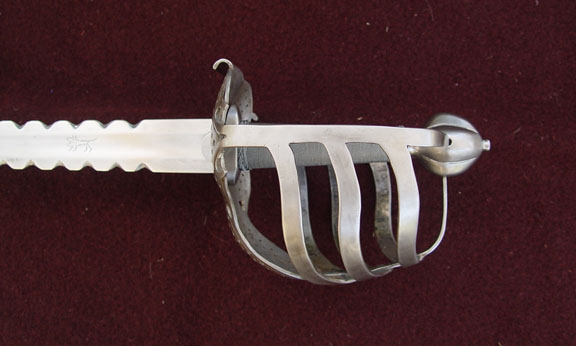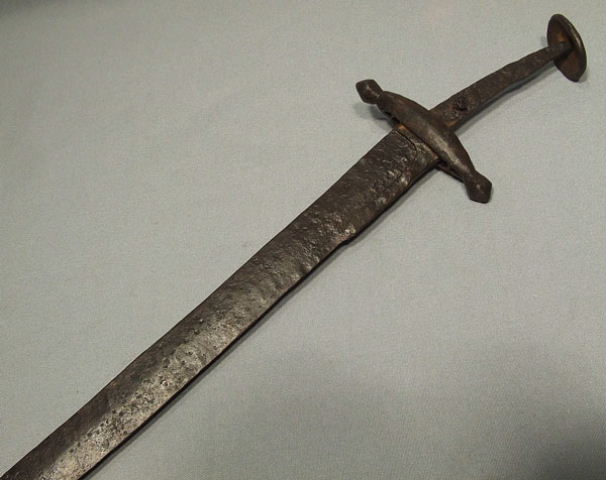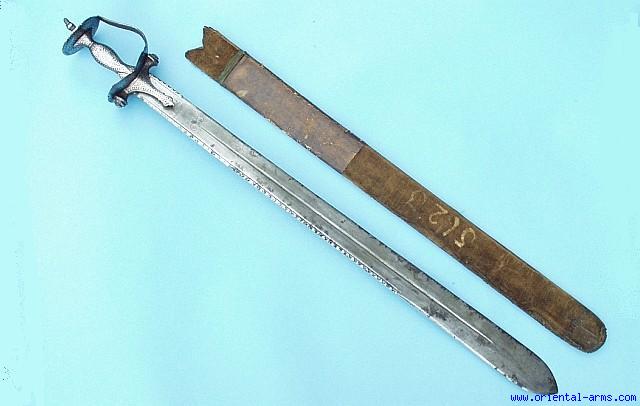Am I to understand that ricassos were never more than unsharpened sections of blade close to the hilt? Never trimmed with langets or used to describe the half swording sword's mid blade grip?
Are langets only on the blade's face, and not on the edge?
What about seax's and falcata spines? Are they ever documented with enshrouded spines?
I'm just trying to firmly set these terms straight in my head again and find pictures of examples.
Hi Alex. As I understand the term a langet is not a part of the blade at all. As you are familiar with the Conan swords; on the Atlantean, the langets would be the extensions of the guard which run down either side of the ricasso section of the blade. So the langets do run down the edge not the face of the blade.
As for historical examples, these seem to be far more a feature of pole-arms. The langets are the strips, or sections, of metal which are used to secure the business end, whether it be axe-head, hammer, spike, etc, to the shaft.
If anybody does know of any historical examples of swords with langets running down from the hilt, it would be interesting, as I can't think of any off-hand.
Hope that is some help,
Cheers,
Darrin.
As for historical examples, these seem to be far more a feature of pole-arms. The langets are the strips, or sections, of metal which are used to secure the business end, whether it be axe-head, hammer, spike, etc, to the shaft.
If anybody does know of any historical examples of swords with langets running down from the hilt, it would be interesting, as I can't think of any off-hand.
Hope that is some help,
Cheers,
Darrin.
"If anybody does know of any historical examples of swords with langets running down from the hilt, it would be interesting, as I can't think of any off-hand."
Mortuary swords commonly have langets, they seem to act as a kind of spacer or shim on some examples like this one:
http://www.myArmoury.com/albums/displayimage....amp;pos=38
The langets on these swords are not always extensions of the guard they can be L shaped and separate from the rest of the hilt components. In this case they perform at least 2 functions:
1. spacing out the grip from the basket
2. spacing the blade tang from the slot in the basket.
This makes the basket easier to fit to the blade and keeps the whole construction "tight" when in use.
This is my mortuary hilt sword (modern reproduction) that uses separate langets in it's construction:
 Attachment: 34.82 KB
Attachment: 34.82 KB

 Attachment: 71.76 KB
Attachment: 71.76 KB
[ Download ]
Mortuary swords commonly have langets, they seem to act as a kind of spacer or shim on some examples like this one:
http://www.myArmoury.com/albums/displayimage....amp;pos=38
The langets on these swords are not always extensions of the guard they can be L shaped and separate from the rest of the hilt components. In this case they perform at least 2 functions:
1. spacing out the grip from the basket
2. spacing the blade tang from the slot in the basket.
This makes the basket easier to fit to the blade and keeps the whole construction "tight" when in use.
This is my mortuary hilt sword (modern reproduction) that uses separate langets in it's construction:

[ Download ]
| Darrin Hughes wrote: |
| Hi Alex. As I understand the term a langet is not a part of the blade at all. As you are familiar with the Conan swords; on the Atlantean, the langets would be the extensions of the guard which run down either side of the ricasso section of the blade. So the langets do run down the edge not the face of the blade.
|
Langets are common on 2-hand claymores, and they typically run down the face of the blade, not the edges. I can't think of historic examples where they run down the ricasso's edges.
I would be hesitant to apply terminology for historic swords to Conan-related items. :)
For historical purposes, a ricasso is simply an unsharpened part of the blade, typically thickened and/or rectangular in cross-section. The term is almost always (if not always) applied to the section nearest the guard/hilt. There are swords with an unsharpened section midway down the blade (found in period art and a few surviving antiques), but I'm not sure ricasso is the proper term for those sections.
For examples of ricassos (actually, ricassi), check out our Type XIX spotlight. Many Type XIX blades (though not all) had a ricasso, often decorated along its edges.
| Alex Oster wrote: |
|
What about seax's and falcata spines? Are they ever documented with enshrouded spines? |
Alex, when you say enshrouded spines, are you referring to being covered with another material....or some unusual cross section? Do you have a pic of the type of thing you're asking about?
Thanks,
Dan
Chad.
Of course, you are right about the claymores, and Mr. Willet also with the Mortuary swords. I would like to plead tiredness as I'd just finished a night shift, but in all honesty I just forgot. :blush: As neither of these sword types falls within my particular area of interest, they don't tend to sit at the front of my brain. As far as using the Conan sword as an example goes though, I would say it is valid, as a langet is a technical term, and so can apply to a fantasy item or historical piece. The position is different, as you say, edge rather then face, but the terminology remains the same. This is why I tried to make the distinction when I asked about historical examples.
One thing that I would ask. Are the langets on Claymores purely decorative? As I mentioned before, with pole weapons the langets do serve the purpose of helping to stabilise the weapon, an actual part of the construction. I can't see that this is the case with Claymores, as they seem to be just extensions of the guard, with no connection to the blade. To go back to the Conan swords, this would be just like the skulls on the Father's sword, which serve no real purpose other than to look good.
Cheers,
Darrin.
Of course, you are right about the claymores, and Mr. Willet also with the Mortuary swords. I would like to plead tiredness as I'd just finished a night shift, but in all honesty I just forgot. :blush: As neither of these sword types falls within my particular area of interest, they don't tend to sit at the front of my brain. As far as using the Conan sword as an example goes though, I would say it is valid, as a langet is a technical term, and so can apply to a fantasy item or historical piece. The position is different, as you say, edge rather then face, but the terminology remains the same. This is why I tried to make the distinction when I asked about historical examples.
One thing that I would ask. Are the langets on Claymores purely decorative? As I mentioned before, with pole weapons the langets do serve the purpose of helping to stabilise the weapon, an actual part of the construction. I can't see that this is the case with Claymores, as they seem to be just extensions of the guard, with no connection to the blade. To go back to the Conan swords, this would be just like the skulls on the Father's sword, which serve no real purpose other than to look good.
Cheers,
Darrin.
I guess I am just trying to get a better grasp overall on the terms through photos if I could.
Thanks to the replies though.
My thoughts on the seax was exactly that. I thought I remembered one with something covering the spine, but I'm not that familiar with them.As I said, it could have been on a falcata or something else.
Thanks to the replies though.
My thoughts on the seax was exactly that. I thought I remembered one with something covering the spine, but I'm not that familiar with them.As I said, it could have been on a falcata or something else.
Now I come to think about it, a number of middle eastern/central asian swords have this extension running down from the guard as well, although I still can't see what purpose it serves. I really should try to engage brain before I start typing :idea:
Just as an aside, I have some pictures of an early Magyar Sabre which I was hoping to have a reproduction of made at one time. Due to recent changes in the law, this has had to be shelved until I find out whether I can legally go ahead with the project. However, one interesting feature is a piece of metal which extends down the length of the blade for a short distance. This is not a piece of the guard, but is actually folded around and over the base of the blade. I believe this is referred to as a forte, not a langet, but as one of Alex's other questions was about 'enshrouded blades' I thought I'd include it.
Cheers,
Darrin.
 Attachment: 44.51 KB
Attachment: 44.51 KB

Just as an aside, I have some pictures of an early Magyar Sabre which I was hoping to have a reproduction of made at one time. Due to recent changes in the law, this has had to be shelved until I find out whether I can legally go ahead with the project. However, one interesting feature is a piece of metal which extends down the length of the blade for a short distance. This is not a piece of the guard, but is actually folded around and over the base of the blade. I believe this is referred to as a forte, not a langet, but as one of Alex's other questions was about 'enshrouded blades' I thought I'd include it.
Cheers,
Darrin.

I can second that. It appears to be common on later century Khandas in India and on some swords the "langet" even extends up to the false edge. heres a few pics of the variety.
[/img][/url]
 Attachment: 18.52 KB
Attachment: 18.52 KB

Single Khanda with langet extending half way up the blade
[/img][/url]

Single Khanda with langet extending half way up the blade
Other Khanda pics.
 Attachment: 27.93 KB
Attachment: 27.93 KB

This sword appears to have a well decorated back instead of a langet.
 Attachment: 112.21 KB
Attachment: 112.21 KB
Various Indian swords. All the Hindu style Khandas in this pic also have long langets. [ Download ]

This sword appears to have a well decorated back instead of a langet.
Various Indian swords. All the Hindu style Khandas in this pic also have long langets. [ Download ]
Page 1 of 1
You cannot post new topics in this forumYou cannot reply to topics in this forum
You cannot edit your posts in this forum
You cannot delete your posts in this forum
You cannot vote in polls in this forum
You cannot attach files in this forum
You can download files in this forum
All contents © Copyright 2003-2006 myArmoury.com — All rights reserved
Discussion forums powered by phpBB © The phpBB Group
Switch to the Full-featured Version of the forum
Discussion forums powered by phpBB © The phpBB Group
Switch to the Full-featured Version of the forum